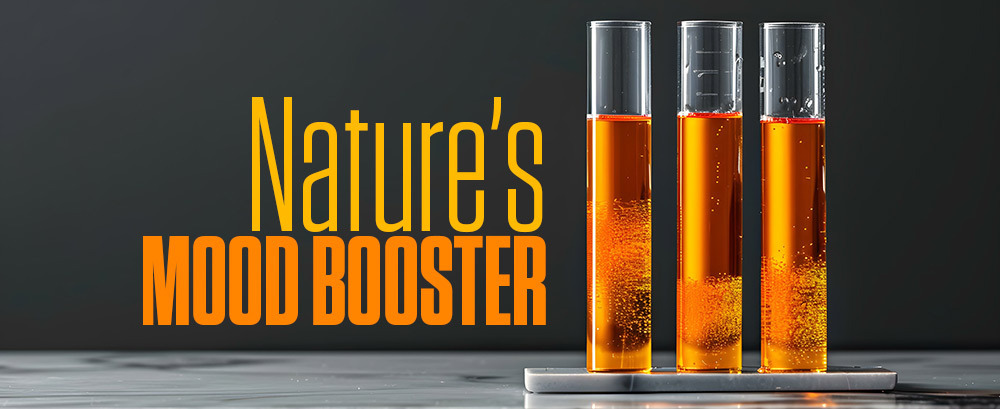Written by Chris Shugart
Curcumin relationship
More than 17 million Americans suffer from depression or anxiety, and the medications used to treat them can be harsh. Is this a natural remedy?
You know what’s depressing? Antidepressants. Common side effects include weight gain, sexual dysfunction, sleep problems, nausea, and headaches. Enough to make anyone, well, sad.
In recent years, many researchers have questioned the “chemical imbalance” theory (impaired monoaminergic neurotransmission, especially with regard to serotonin availability). Some researchers have investigated basic nutritional deficiencies. Correcting these common deficiencies would probably eliminate the need for all of those drugs. Or, at least, smaller doses of these drugs may be effective if diet is appropriate.
Other researchers looked at all the biological disorders currently known to be associated with depression. These include:
- Hypothalamic-pituitary-adrenal (HPA) axis dysregulation
- Activation of immune inflammatory pathways
- Increased oxidative and nitrosative stress
- Neuroprogression (repeated depressive episodes cause cumulative damage and changes in brain physiology)
- mitochondrial dysfunction
Their goal was to find natural compounds that target these same pathways and biological mechanisms. One of those compounds is curcumin (Purchased on Amazon).
the study
Researchers have found from previous studies that curcumin lowers markers of oxidative stress, modulates immune inflammation (by acting as a COX-2 inhibitor), lowers proinflammatory cytokines, and provides important neuroprotection. We knew that it could provide and modulate HPA activity and influence monoamine transmission through its effects. Regarding serotonergic and dopaminergic activity. But they wanted to test it in people with major depressive disorder.
Scientists recruited 28 men and women suffering from depression (but not suicidal thoughts) into the placebo group and 28 into the curcumin group. One group took 500 mg curcumin capsules twice a day. The placebo group took capsules containing inert cellulose. The entire process was randomized and double-blind.
Subjects completed two different gold standard questionnaires several times during the 8-week study: the IDS-SR to assess depression and the STAI to assess anxiety.
what happened?
For the first four weeks, no one felt depressed or anxious, including those who took the placebo. Then something interesting happened. Those in the curcumin group continued to feel better and had fewer symptoms of depression, whereas those in the placebo group did not.
In all such studies, researchers expect the placebo group to improve within the first few weeks. There’s even a name for it: the placebo effect. (Be creative!) The placebo effect usually wears off after two weeks.
However, improvements continued for curcumin users from week 4 to week 8. The researchers noted that “Curcumin was significantly effective in reducing total depressive symptoms, mood/cognitive depressive symptoms, arousal-related symptoms, and trait anxiety.”
Here’s what you need to know
As always, more research is needed and no one is telling us to stop taking drugs yet, but the research is promising. Some scientists even claim that curcumin may help prevent depression and anxiety from developing in the first place, perhaps due to its anti-inflammatory properties.
What researchers want to focus on is the dosage of curcumin. As scientists, they can only say that 500mg twice a day worked, but they would like to try different doses.
Hopefully they will research high absorption curcumin. In their study, they used generic curcumin because that was all that was available at the time. But now there is micellar curcumin (Purchased on Amazon) Uses solid lipid curcumin particles (95% more bioavailable). Although the researchers used standardized curcumin, lipidated curcumin produces 95 times more free curcumin in the bloodstream than standardized curcumin containing piperine. Perhaps the results would have been even better if the micelles had been used, or perhaps the same results could have been achieved with the micelles by using less curcumin.
Curcumin is primarily known as a natural inflammation-fighting and heart-healthy supplement, but it also appears to be helpful for mood disorders. Whatever your reason for taking it, be sure to use the micellar form for best results.
reference
- Lopresti et al. “Curcumin for the Treatment of Major Depression: A Randomized, Double-Blind, Placebo-Controlled Study” J Affect Disorders. 2014:167:368-75. DOI: 10.1016/j.jad.2014.06.001. Epub 2014 6 11.

